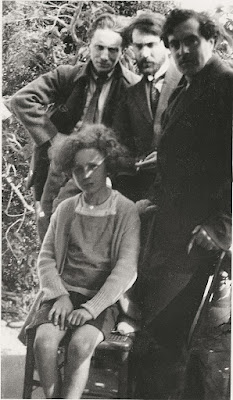THE ROMANCE OF ASTREA AND CELADON (LES AMOURS D'ASTRÉE ET DE CÉLADON)
Eric Rohmer's new film is a wonderful, light comedy of love, jealousy, loss and lovers re-united, perfect for this season. It seems to follow after the lightest of Shakespeare's comedies, there is a deliberate concatenation of eras and epochs as a Bucolic idyll set in 5th century Gaul is reformulated through the 16th century and then finally to our own time. The story of Astrea and Celadon is fitted exactly to the 16th century, the era of the High Renaissance, because of the intensity of its idealisation of 'nature' (as against culture) and the themes of jealousy, loss echoed in Celadon's death and subsequent posing as a woman. Celadon then falls in love again with Astrea, who suffers the jealousy of the other shepherdesses and her own sexual ambiguity in falling in love ardently with another 'woman'. There are some beautiful touches, such as Rohmer's handling of Astrea's friends, the gentle but wonderful comic dialogue and a sudden reinvention of the era of Shakespeare and Milton. The Romance of Astrea and Celadon is a wonderful film that truly deserves to be a massive hit for Rohmer.
THE ROMANCE OF ASTREA AND CELADON
(LES AMOURS D'ASTRÉE ET DE CÉLADON) (CERT TBC)
A film by Eric Rohmer
Official Selection In Competition - Venice Film Festival 2007
Starring
Andy Gillet, Stéphanie Crayencour and Cécile Cassel
France / 2007 / 107 Mins / In French with English Subtitles / Colour / 1.85
UK RELEASE DATE: 12th September 2008
Artificial Eye Film Company, 20 - 22 Stukeley Street London WC2B 5LR
In an enchanted forest, back in the time of the Druids, the shepherd Céladon and the shepherdess Astrée share a pure and chaste love. Fooled by a suitor, Astrée dismisses Céladon, who throws himself into a river out of despair. She thinks he’s dead, but he’s been secretly rescued by some nymphs.
Faithful to the promise he made to Astrée to never appear before her again, Céladon must overcome many obstacles to break the curse. Mad with love and despair, coveted by the nymphs, surrounded by rivals, and obliged to disguise himself as a woman to be near the one he loves, will he manage to make himself known without breaking his oath?
A romance filled with doubt, hazards, and delicious temptations.
Eric Rohmer, the director almost single-handedly responsible for the reputation of French dramas as talky yet intelligent, shows he has lost nothing of his rigour at age 87 with his new – and apparently last – film The Romance of Astrea and Celadon). The oldest of the New Wave directors, has opted for an earnest adaptation of an early 17th century literary text from Honoré d'Urfé that recounts a story set in 5th century France as imagined in 1607, taking the text and its idealised version of a half-Roman, half-pagan Gaul with a Christian overlay at face value. The whole set-up is very much in the tradition of lighter Shakespeare in general and As You Like It in particular. Though at first sight THE ROMANCE OF ASTREA AND CELADON may seem like the odd one out in Rohmer’s oeuvre, it is essentially a tale of fidelity, one of the auteur’s pet themes that also surfaces in his contemporary films, from Ma nuit chez Maud (My Night at Maud’s) to Conte d’hiver (A Tale of Winter).
One of the leading figures of the French nouvelle vague and a contemporary of Jean-Luc Godard, Francois Truffaut and Louis Malle, veteran filmmaker Eric Rohmer is firmly established as one of world cinema’s greatest and most enduring directors. Eric Rohmer (1920) has been a film maker since the 1950's and was editor for Cahiers du Cinema from 1953 to 1963. Now aged over 80, the reclusive former schoolteacher has made more than 22 films and has a list of international awards including: two Oscar nominations (‘Claire’s Knee’ 1970); the prestigious French Prix Louis Delluc for ‘Claire’s Knee’; the Special Jury Prize at Cannes, 1975, for ‘Die Marquise von O’; the Berlin Silver Bear for ‘Pauline at the Beach’, in 1983; the Golden Lion at Venice, 1986, for ‘The Green Ray’; and 'An Autumn Tale' winning the Silver Lion at Venice Film Festival 1998.

Comments